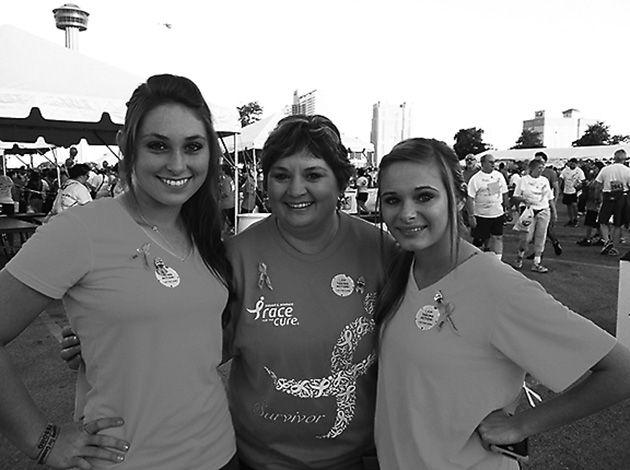In some cases, the word cancer can be as taboo as saying curse words in a church — it’s just something you avoid talking about altogether. It’s a scary, vulnerable and hard word to digest, especially when it’s in reference to someone close to you.
Being the daughter of a breast cancer survivor, I know all about the different reactions that come from the initial shock of the “I’ve been diagnosed with cancer” conversation. From the tongue-tying shock to the bottled-up strength and super supporters, often no one really knows the right words to say.
Cancer is something we see in movies and read about in books, not a disease we think is ever going to affect us directly. When someone you know has cancer, it’s hard to know where to start, because honestly you’re scared of where it might end. The thought of surgeries, intense treatment, hair loss and even losing a loved one is more than enough to leave you at a loss for words. Imagine how scared they are.
In my experience, my mom was just as shocked to hear the diagnosis as I was. There was no family history and no medical explanation for how it occurred — just one unexpected mammogram result and life-changing news to swallow.
Cancer uproots the basis of your day-to-day life, so in most cases people with cancer are just searching for normality again. Being diagnosed can sometimes cause a “talk of the town” phenomenon, and often people just want to feel like a normal human again instead of being looked at as a sick cancer patient. An easy way to break that barrier is to simply talk to them like they are normal, because their illness doesn’t define them. A break from cancer talk would probably be refreshing.
On another note, life with cancer is far from ordinary, so it’s okay to let down your guard of super strength every once in a while, too. I know that people may not want to show their emotions in spite of how others feel, but from first-hand experience, you can only go so long before you break. If the person is comfortable talking about it, it’s okay to step out of your comfort zone to talk about it too. Ask questions, listen to them vent, cry it out — whatever works best. Cancer can’t be avoided, so we might as well acknowledge it, embrace it and do our best to BTHO it the best we can.
I think everyone accepts it differently and goes through stages. I’ll admit at first I was mad at the world, asking, “Why her?” But things shifted throughout the experience. I simply dedicated myself to becoming her biggest supporter, making it my personal challenge to make sure she never had a reason to give up hope. Breast cancer isn’t all pink ribbons and motivational mottos, it was an extremely hard time in my life — and I was just watching.
One thing that really helped my mom get through was the overflowing love and support from my family, friends and community. Whether it was someone bringing her dinner, receiving a positive text message or just having someone ask if her wig was her real hair (even though she knew it was obvious) made the situation a little more comforting. Having someone to turn to when she was ready to talk definitely beat feeling misunderstood or alone.
No matter how the situation affects you personally, it’s just important to keep your loved one’s feelings in consideration during that hard time in their life. Obviously everyone has their own battles they choose to fight in different ways, but from my experience it helps to just do what you can, and do it with a smile.
Cancer is tough. It tests your strength to no end, forces you to fight to within an inch of your life and takes just about everything out of you in the process. Positivity, hope and support are a few constant things to hold on to during the shaky time of life that cancer throws your way. It’s okay to express it — you never know when your words will be the ones that ignite inspiration.
Samantha Latta is a communication sophomore and a news writer for The Battalion.
Photo provided.
The cancer conversation: it’s okay to talk about it
October 5, 2014
Donate to The Battalion
Your donation will support the student journalists of Texas A&M University - College Station. Your contribution will allow us to purchase equipment and cover our annual website hosting costs.





















